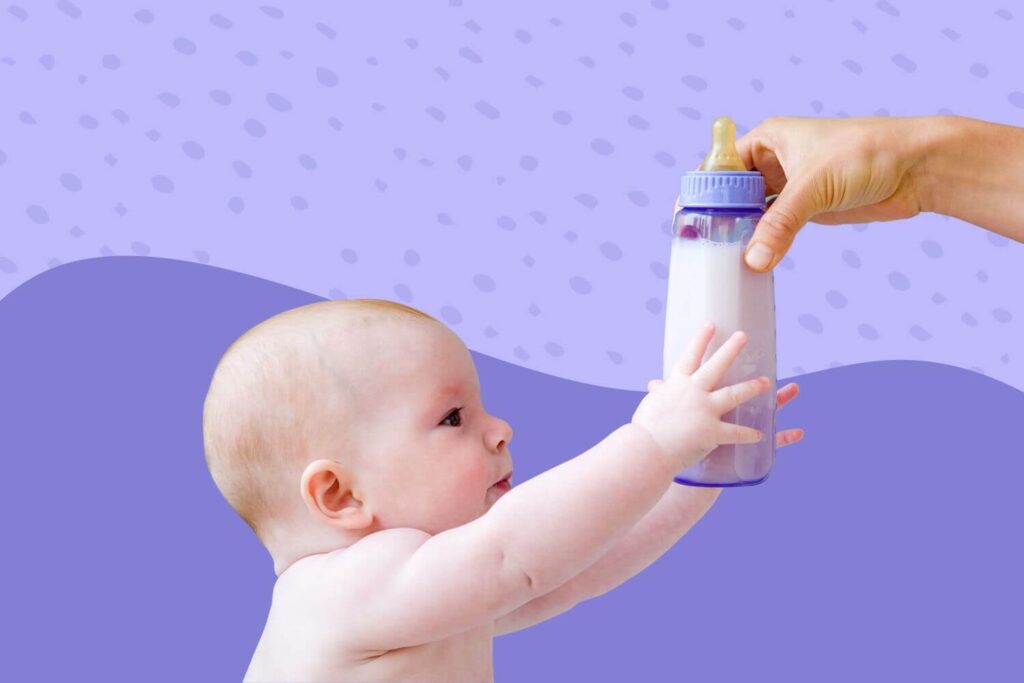Best Milk For 1 Year Old Baby
Are you wondering what the best milk for a 1-year-old baby is? I know that it can be hard to figure out, but we have some great tips. You should also check out our blog post on how to make homemade toddler formula.
We all want what is best for our kids. So when it comes to the type of milk we feed them, what should we be giving them? The American Academy of Pediatrics recommends that infants be exclusively breastfed until they are six months old and then continue breastfeeding as long as mother and baby mutually desire. For those who cannot or choose not to breastfeed, iron-fortified infant formula is recommended with vitamin D supplementation if needed. After one year, whole cow’s milk may also be an acceptable option but low-fat (1%) or fat-free (skim) milk may be preferable due to the high saturated fat content in whole milk.
A lot of moms worry about their children’s nutrition and want them to grow up healthy and strong. One of the most important things a mother needs to do is feed her child nutritious food, which includes providing appropriate amounts of calcium, protein, vitamins A & D as well as iron. The key nutrients in cow’s milk are vitamin B12, vitamin C, and riboflavin (B2).
While whole milk should be avoided in favor of low-fat or fat-free milk after the first year, it’s important to note that not all toddlers need cow’s milk. Toddlers who consume enough fruits, vegetables, and other protein sources may not need cow’s milk as a main source of nutrition. Talk to your pediatrician if you have any concerns about whether or not your toddler is getting the nutrients they need.

1. Cow milk
Cow milk is a great choice for 1-year-olds. It has the right balance of nutrients to help them grow and develop. cow milk also contains calcium, vitamin D, and protein which are all important for toddlers.
Some parents choose to give their children cow milk if they are not breastfeeding. If you are going to give your child cow milk, make sure that you buy organic milk. This is because conventionally-produced cow milk contains high levels of pesticides and other chemicals.
If your child is lactose intolerant, you can buy lactose-free cow milk. Lactose-free cow milk has been processed to remove the lactose sugar, so your child can digest it more easily. You can also buy soy or rice milk for your 1-year-old if they are lactose intolerant.
2 Rice milk
Rice milk is gluten-free and easy to digest, so it’s a great choice for 1-year-olds with food allergies or digestive issues. It contains small amounts of protein and calcium, but not as much as cow milk.
Some brands of rice milk contain added vitamins, such as vitamin A and D. However, some children’s rice kinds of milk have a high level of sugar so you need to check the label if your child has diabetes or obesity.
3. Almond milk
Almond milk is a good choice for 1-year-olds to drink if they are lactose intolerant or have an allergy to cow milk. It contains small amounts of protein, but only one-third the amount that cow milk does. It also contains very little calcium and no vitamin D, so don’t rely on it as a source of nutrition.
Some brands of almond milk contain added vitamin D and calcium, so if your child drinks them you don’t need to give them additional vitamins. Be aware though that too much vitamin D can be dangerous for toddlers (see #5). Most almond kinds of milk are made from ground almonds and water, but some contain additives and sweeteners, so always check the label.
4. Soy milk
Soy milk is a good alternative to cow or almond milk if your child has a dairy allergy or is lactose intolerant. It contains small amounts of protein, calcium, and vitamin D. Some brands don’t contain any added sugar, while others do, so always check the label.
Soy milk can be bought in both regular and unsweetened versions. If you are giving your child soy milk, make sure that they are also eating other foods that contain protein, such as meat, eggs, or beans.
5. Too much vitamin D
If your child drinks cow milk, almond milk, or soy milk, they can get vitamin D from these kinds of milk. However, too much vitamin D can be dangerous for toddlers so you should give them no more than the recommended amount.
According to the American Academy of Pediatrics, most kids need 400 IU of vitamin D per day. However, some soy milk brands contain up to 1,500 IU of vitamin D per serving. This is more than three times the recommended amount, so be careful when choosing a soy milk brand for your child.
6. Homemade toddler formula
If you are not comfortable giving your child cow milk or soy milk, you can make your own homemade toddler formula. This is a great option if your child has a food allergy or is lactose intolerant.
To make homemade toddler formula, you will need:
-1 cup of organic cow milk
-1/4 cup of organic unsalted butter
-1/4 cup of organic coconut oil
-1/4 cup of organic heavy cream
-2 tablespoons of lactose-free powdered milk
-1/4 teaspoon of sea salt
Optional: for added vitamins and minerals, you can also add 1/4 cup of a high-quality multivitamin and mineral supplement.
Instructions:
- In a saucepan, heat the cow milk, butter, coconut oil, and heavy cream until it just starts to boil.
- Remove from the heat and add the lactose-free powdered milk and sea salt. Stir until well combined.
- Allow the mixture to cool slightly before pouring it into a blender. Blend on high for 30-60 seconds until it is completely smooth.
- Pour the mixture into a container and store it in the fridge. It will keep for 3-4 days.
This homemade toddler formula provides your child with all the nutrients they need, including protein, calcium, and vitamin D. It is also free from allergens, such as nuts, soy, lactose, and dairy.
Note: if your child has a nut allergy you will need to use the high-quality multi-vitamin without any added nuts or seeds. If they have an egg allergy you can also leave out the powdered milk since it contains dried milk powder.
Conclusion:
The best milk for a 1-year-old baby is soy milk, followed by almond milk. Cow milk should only be used as a supplement along with other nutritious foods like meat and eggs. If you are trying to avoid dairy, you can also make your own homemade formula that contains the nutrients your child needs.


